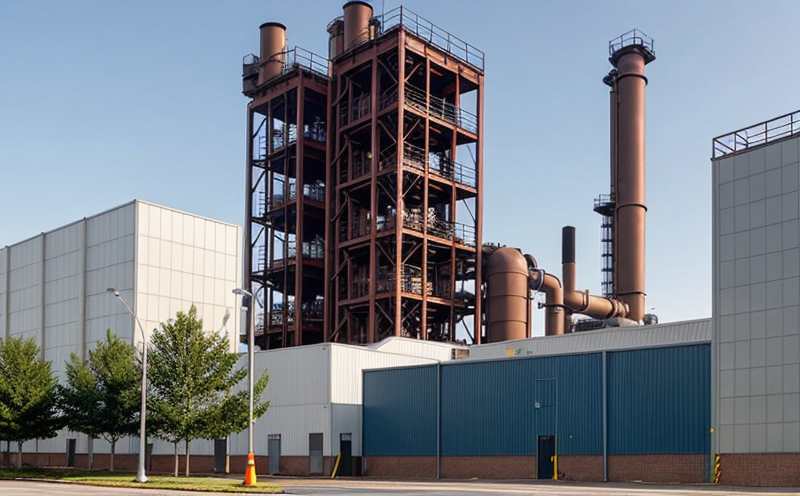EN 13445 Pressure Vessel Standards Compliance Testing
The EN 13445 standard is a cornerstone of pressure vessel design and manufacturing, ensuring safety and compliance with European Union directives. This testing service ensures that all components adhere to the stringent requirements laid out in this standard.
EN 13445 applies specifically to pressure vessels used in industrial processes where high-pressure containment is necessary for the safe handling of fluids or gases under pressure. Compliance with this standard is crucial as it not only guarantees safety but also ensures that products meet regulatory and quality standards, reducing potential risks associated with non-compliance.
The testing process involves a series of inspections, examinations, and tests aimed at verifying structural integrity, material properties, and mechanical behavior of the vessel under various loading conditions. This encompasses everything from visual inspections to non-destructive testing methods such as ultrasonic testing (UT), radiographic testing (RT), and magnetic particle inspection (MPI).
For materials, EN 13445 mandates specific types based on the working pressure, temperature range, and service environment of the vessel. The standard also specifies detailed procedures for heat treatment, forging, welding, and non-destructive testing to ensure that the material is fit-for-purpose.
The testing process includes several critical steps:
- Visual inspection: Ensuring there are no visible defects on the surface.
- Non-destructive testing (NDT): Utilizing UT, RT, and MPI techniques to identify internal flaws without damaging the component.
- Pressure testing: Subjecting the vessel to a specified pressure to check for leaks and structural integrity under stress.
- Material property verification: Ensuring that all materials meet the required mechanical properties as outlined in EN 13445.
The detailed compliance process ensures that every aspect of the pressure vessel, from design through manufacturing and installation, adheres to stringent European standards. This not only enhances safety but also builds trust with customers and stakeholders.
In addition to the technical aspects, EN 13445 compliance testing is vital for maintaining a good reputation in the industry. Compliance demonstrates a commitment to quality and safety, which can be a significant differentiator in competitive markets. It also helps businesses navigate complex regulatory landscapes, ensuring they are prepared for audits and inspections.
Our team of experts ensures that each step of the process meets international standards. From initial consultation to final certification, we provide comprehensive support throughout the entire compliance journey. Our clients benefit from a thorough understanding of their specific needs, tailored testing protocols, and actionable insights that drive continuous improvement in product quality and safety.
By adhering to EN 13445, businesses can ensure they are meeting regulatory requirements while also enhancing operational efficiency. This standardization leads to safer operations, reduced risk, and increased confidence among end-users.
Why It Matters
The importance of EN 13445 compliance cannot be overstated in the context of industrial manufacturing and processing. Pressure vessels are critical components that must perform reliably under extreme conditions, often involving high temperatures and pressures. Any failure can lead to catastrophic consequences, including loss of life, severe injuries, property damage, and significant financial losses.
From a regulatory perspective, compliance with EN 13445 is mandatory in many sectors where pressure vessels are used. Failure to comply can result in penalties, legal action, and even business closure. From an operational standpoint, adherence ensures consistent quality and reliability, which are essential for maintaining production schedules and meeting customer expectations.
Compliance with EN 13445 also enhances a company's reputation within the industry. It demonstrates a commitment to safety and quality, fostering trust among stakeholders, including customers, suppliers, and regulatory bodies. This can lead to increased market share and enhanced business relationships.
The standard is not just about meeting legal requirements but also about ensuring that products are fit-for-purpose and reliable in real-world applications. By adhering to these stringent standards, businesses can minimize risks, improve operational efficiency, and ensure long-term sustainability.
Benefits
Adhering to EN 13445 offers numerous benefits that extend beyond mere compliance:
- Enhanced Safety: Ensures that pressure vessels are designed and manufactured to the highest safety standards, reducing the risk of accidents.
- Regulatory Compliance: Helps businesses avoid legal penalties and inspections by ensuring all processes meet regulatory requirements.
- Increased Reputation: Demonstrates a commitment to quality and safety, enhancing the company's reputation in the industry.
- Operational Efficiency: Ensures reliable performance of pressure vessels, minimizing downtime and maintenance costs.
- Cost Savings: By identifying and addressing issues early in the manufacturing process, businesses can save on potential repairs and replacements.
- Customer Trust: Builds trust with customers by ensuring that products meet high-quality standards and are safe for use.
- Sustainability: Ensures long-term reliability of pressure vessels, contributing to sustainable operations.
In summary, adhering to EN 13445 not only meets regulatory requirements but also enhances safety, operational efficiency, and business reputation. It is an essential step towards achieving excellence in industrial manufacturing and processing.
Customer Impact and Satisfaction
Our clients benefit significantly from our EN 13445 compliance testing service:
- Confidence in Safety: Our tests provide assurance that pressure vessels meet the highest safety standards, reducing risks and enhancing customer confidence.
- Improved Quality: By adhering to strict quality control measures, we ensure consistent product quality, leading to satisfied customers.
- Cost Efficiency: Early identification of issues during manufacturing reduces the need for costly repairs or replacements later in the lifecycle of the vessel.
- Better Reputation: Compliance with EN 13445 enhances our clients' reputation in the industry, leading to increased market share and better business relationships.
- Operational Efficiency: Reliable performance of pressure vessels ensures uninterrupted operations, minimizing downtime and maintenance costs.
- Regulatory Compliance: Ensures that all processes meet regulatory requirements, avoiding potential legal issues and inspections.
Our clients can rest assured knowing that they are working with a team of experts who understand the complexities of EN 13445 compliance testing. We provide comprehensive support throughout the entire process, ensuring that every step meets international standards. This level of expertise and attention to detail ensures that our clients achieve their goals while maintaining high levels of safety and quality.





